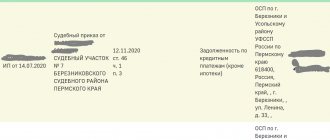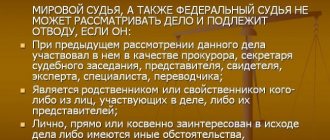Any court decision with which the accused does not agree can be appealed in a supervisory procedure. Decisions in criminal cases are no exception. Based on the results of consideration of the complaint, the supervisory court may cancel the sentence, change it or uphold it. The procedure for filing an application is regulated by Chapter 48.1 of the Criminal Procedure Code. At the end of the article you can download a sample document.
Overview of the structure of a supervisory complaint
In order for a supervisory complaint in a criminal case to be accepted and considered, it must be drawn up in accordance with the requirements of the Criminal Procedure Code. It is submitted against a resolution received in a previous instance and which has entered into legal force.
Important! In accordance with Article 375 of the Code of Criminal Procedure, a supervisory complaint that does not contain all the data required by law is returned without consideration.
The following is an outline of the document.
- Addressee details. The judicial body of the subject of the Russian Federation is indicated.
- Applicant details. List your full name, position in the process, place of residence.
- Name of the form.
- The decision being appealed. It is indicated in which court the criminal case was heard and the essence of the decision is reflected.
- The results of challenging the appeal and cassation procedures. If the applicant has not applied to these authorities, this should also be indicated.
- Applicant's position. Arguments are given on the basis of which the accused (or other participant in the process) does not agree with the decision made. It is necessary to clearly list what, in the applicant’s opinion, is the illegality of the court decision.
- Applicant's request. Here you can ask to initiate supervisory proceedings and to cancel the decision.
- List of applications. Submit all documents attached to the application.
- Date of preparation.
- Applicant's signature.
A copy of the appealed court decision must be attached to the application. If an appeal and cassation were filed in the case, copies of the decisions are attached. It makes sense to attach all documents that support the applicant’s arguments. These may include medical certificates, awards, and other documents.
Everything about criminal cases
Mystery room
— violation of the secrecy of the deliberation room is directly mentioned by the Supreme Court among the violations “distorting the essence of justice” (clause of the Plenum No. 2). That is, this is a “strong” violation.
Unconditionality
- in cassation, unlike in appeal, “obvious” and “unconditional” reasons for cancellation are not so strictly indicated. The appeal norm, part 2 389.17, contains a list of obvious grounds for cancellation; the cassation norm (part 2 and part 3 401.15 of the Code of Criminal Procedure) has 2 purely “technical” grounds, but there is no such direct list as for an appeal;
— those violations that work on appeal may not work on cassation: because:
a) for an appeal: procedural violations “that influenced or could have influenced the outcome of the case” are sufficient, that is, even the alleged influence on the outcome of the case is subject to assessment (Part 1 389.17);
b) for cassation: only those “that influenced the outcome of the case” are needed (part 1 401.15);
Primary arguments
- these are those violations that you assess as the most “strong”, most obvious and closest to “significant”;
— their role: to break through the “barrier” of primary examination, to convince the judge to transfer the case for consideration.
Beginning of the complaint
- in a cassation appeal, the strongest argument should go in the first “line”;
— task: to interest the judge conducting the initial “study” of the complaint. If we start our presentation with secondary “weak” arguments, then we waste the judge’s attention resource;
- if, for example, in lower courts in debates, it is quite appropriate to build a tactic of “warming up, then we present the strongest arguments”, then in a cassation appeal I would not do this (personal opinion, but I am completely convinced of it, the cassation appeal is not at all tolerates excesses and “prettiness”).
Secondary Arguments
- in addition to the primary arguments, you have others that you do not rate as “strong”. During the time that has passed before the cassation stage, you have accumulated a “baggage” of identified (or contrived) violations committed in the first instance and appeal. All these “clues” are asked to be used; it is almost impossible to refuse to use them for psychological reasons: “what if this particular argument works,” “I can’t remain silent about violations.”
— what to do with them? Usually, applicants do not even ask such a question, and without any hesitation “stuff” the cassation appeal with a mass of arguments, any that seem at least somewhat significant to them.
Why is this the wrong tactic?
- You bury correct arguments in a mass of erroneous ones. The complaint, set out on 10 pages, containing a lot of references to constitutional norms, incoherent lamentations and pleas, simply drowns out those arguments that could “work.” Judges are ordinary people who do not have super insight, and they are not at all happy to separate the “wheat from the chaff”;
- such complaints already contain the most convenient “clues” for refusal, making it easier for the judge to argue, that is, you give easy arguments against yourself;
- in the court decision on refusal, the court will cite your most grossly erroneous demands, and when you appeal the refusal of the complaint at the next stage of the process, then for the judge, again studying the documents in your case, the previous refusal will look well reasoned.
What to do
— limit yourself, highlight only those violations that have at least approximate signs of being “significant”;
— minor violations do not increase the “strength” of the cassation appeal; on the contrary, they waste the judge’s attention and distract him from the real arguments.
Nothing is lost
- if the complaint can overcome the “barrier” of primary study (this will be easier without the burden of small arguments hanging on it), then you do not lose the opportunity to refer to other violations;
— firstly: you can supplement the complaint with new arguments by sending additions “to follow” the main complaint (see more details here);
- secondly: secondary arguments can be presented directly at the court hearing of the cassation court (see more details here).
What is the deadline for submitting an application?
The deadline for filing a supervisory complaint in a criminal case has not been established. Thus, after the decision comes into force, it can be sent to the court at any time.
Previously, there was a rule that determined the period for filing a supervisory complaint of 1 year. However, this restriction was in effect only until the beginning of 2013 and for those petitions that were filed in order to worsen the situation of the accused. During the period from January 1, 2013 to January 11, 2015, the restriction applied to all complaints.
There is currently no deadline for submitting an application. You can send a request:
- while serving a sentence;
- after release;
- after a criminal record has been expunged.
It is worth noting that repeated requests for the same circumstances are not allowed.
Who has the right to appeal?
Issues of appealing decisions of control (supervisory) bodies, actions (inaction) of their officials are regulated by Chapter. 9 of the Federal Law of July 31, 2020 No. 248-FZ “On State Control (Supervision) and Municipal Control in the Russian Federation” (hereinafter referred to as Law No. 248-FZ).
Based on Art. 39 of Law No. 248-FZ, a controlled person (individual, individual entrepreneur or organization) against whom the following have been accepted or committed (Part 4 of Article 40 of Law No. 248-FZ) can file a pre-trial complaint:
- decision to carry out control (supervisory) activities;
- acts of control (supervisory) measures, orders to eliminate identified violations;
- actions (inaction) of officials (inspectors) of the control (supervisory) body within the framework of control (supervisory) activities.
From 2023, an appeal to the court is possible only after a pre-trial procedure. This applies only to legal entities and individual entrepreneurs.
But from July 1, 2021, an experiment is being carried out: Resolution of the Government of the Russian Federation dated April 28, 2021 No. 663 approved the list of types of federal state control (supervision), for which a pre-trial appeal procedure is mandatory.
For more information, see “ When a pre-trial complaint against state control (supervision) is mandatory: list from 07/01/2021 ”.
The basis for filing a complaint is simply the opinion of the controlled person that his rights and legitimate interests were directly violated as part of control (supervision).
Please note that the Regulations on the type of municipal control may establish that pre-trial appeal is not applied unless otherwise prescribed by the federal law on the type of control, the general requirements for the organization and implementation of this type of municipal control, approved by the Government of the Russian Federation.
How long will it take for the application to be considered?
The review period depends on which supervisory authority the documents were sent to. An important factor is the level of workload of the court.
For applications sent to the Supreme Court, the deadlines are as follows:
- 1 month from the date of receipt of documents - if the case materials are not requested;
- 2 months from the date of receipt of documents - if the case materials are requested, the period from the date of request until receipt by the court is not taken into account.
When considering a supervisory appeal in a criminal case, the court has the right to review the entire sentence, as well as evaluate the entire proceedings in the case. If during the proceedings it is discovered that the decision was made illegally or unjustified, and during the consideration there are violations of the Code of Criminal Procedure, the decision will be canceled. The resolution of the Presidium is included in the case materials along with the appeal itself.
Requirements for a complaint
According to Art. 41 of Law No. 248-FZ, a pre-trial complaint must contain the following mandatory items:
- name of the control (supervisory) body, full name (if any) the official whose decision and/or action (inaction) is being appealed;
- FULL NAME. (if any), place of residence (place of business) of the citizen, or the name of the organization, its location, or details of the power of attorney and full name. (if any) the person filing the complaint by proxy;
- the desired method of interaction during the consideration of the complaint and the desired method of obtaining a decision on it;
- information about the appealed decision, action (inaction) that led or may lead to a violation of the rights of the controlled person;
- grounds and arguments for disagreement with the decision, action (inaction) of an official (you can attach supporting documents or copies thereof, if available);
- the requirements of the complainant;
- registration number of the control (supervisory) activity in the Unified Register of Control (Supervisory) Activities in respect of which the complaint was filed (unless otherwise established by the Government of the Russian Federation).
The complaint must not contain:
- obscene or offensive language;
- threats to the life, health and property of officials of the control (supervisory) body or members of their families.
The following can be attached to the complaint regarding its subject:
- Commissioner under the President of the Russian Federation for the protection of the rights of entrepreneurs, his public representative;
- Commissioner for the protection of the rights of entrepreneurs in the region.
The person filing the complaint must receive a response to this position within 1 business day from the moment the decision on the complaint is made.
Where to file a supervisory complaint
A complaint against a decision that has entered into legal force is sent to the supervisory court. There are 2 steps here:
- Presidium of the court of a constituent entity of the Russian Federation.
- Presidium of the Supreme Court of the Russian Federation.
It is worth noting that at the first stage the petition is submitted to the court of the subject (territorial, regional, and so on). If the appeal is rejected, the applicant may appeal directly to the Presidium of the Supreme Court.
Not only the convicted or acquitted can challenge a court decision. Their defenders, legal representatives, as well as the prosecutor participating in the process have the right to do this.
If the applicant is unable to submit an appeal in person, he can challenge the verdict through a representative. In this case, he will need a notarized power of attorney.
Similarities and differences between supervision and other stages of review of criminal court decisions
The different stages of checking the legality of a court verdict have a number of similar features. The main ones are:
- goals pursued;
- legal significance;
- checking the work of lower judicial bodies empowered to administer justice;
- prohibition on worsening the situation of the convicted person;
- monitoring the legality of issued acts;
- identifying errors and issuing instructions for their correction.
Additionally, it must be said that the result of the work at all stages may be the cancellation of the appealed acts as a result of their recognition as unlawful. At the same time, supervision has a number of fundamental differences with appeal. They are as follows:
- types of judicial acts sent for review;
- subjective composition, for example, the appellate authority does not know such subjects as the applicant;
- procedural deadlines and their settlements. For an appeal, the deadlines are prescribed in the Code of Criminal Procedure; for supervision, the deadlines are not regulated by law;
- review procedure. An appeal is a re-examination with a new examination of the evidence. At the same time, in supervision the evidence base is not questioned.
Supervision has a number of fundamental differences with the cassation procedure. The main ones include:
- participants in a cassation appeal may include a convicted or acquitted person, the defense, proxies, victims, private prosecutors, etc. An appeal by way of supervision allows the presence of the applicant, officials, the Prosecutor General of the Russian Federation and his deputies;
- in the first case, the subject of appeal may be documents issued by district judges and an appeal. In the second, this list is supplemented with cassation definitions;
- the cassation appeal process is carried out by the highest judicial body in the subject or military district, as well as the Supreme Court. Supervisory proceedings are the exclusive prerogative of the RF Armed Forces;
- A well-written complaint is a guarantee of cassation proceedings. There is no such guarantee in supervision. It all depends on the judge's opinion.
The main common feature of cassation and supervision is the procedure for receiving a complaint.
What decision can the court make?
Based on the results of the proceedings, the supervisory court makes a decision. Several options for the development of events are possible.
- The complaint was left without consideration. There are a number of grounds for this, including non-compliance of the form of the document with the rules established by Article 412.3 of the Code of Criminal Procedure, submission of an application by an unauthorized person, or submission of a request for revocation.
- The complaint was left unsatisfied.
- The court ruling, which entered into force, was changed on several points.
- All sentences passed by previous courts have been overturned.
In the latter case, the court may decide to completely terminate the proceedings. In some situations, after all decisions are canceled, the case is sent for a new trial to the court of first instance. In addition, the decision of the appellate or cassation instance may be declared unlawful. Then the case will be heard again in the specified judicial authority. Finally, after the verdict is overturned, the case can be transferred to the prosecutor.
The supervisory authority is authorized to evaluate the legality and justification of the court decision. However, a decision is made only within the framework of the submitted complaint. If a convicted person asks for a mitigation of punishment, a more severe preventive measure cannot be assigned to him.
The supervisory appeal is sent to the court of the constituent entity of the Russian Federation, the next instance is the Supreme Court. There is no specific deadline for submitting an application at this time. Failure to comply with the requirements of the Code of Criminal Procedure is grounds for its return without consideration. Therefore, when preparing your appeal, you should familiarize yourself with the legal requirements and consult with a lawyer. Next, you can review the supervisory complaint in a criminal case.
Sample supervisory complaint in a criminal case
Post Views: 1,302
General rules and requirements
To begin with, we note that the control (supervisory) body is obliged to post and keep up to date on its official website, among other things, information about the procedure for pre-trial appeal of its decisions, actions (inaction) of officials (Part 3 of Article 46 of Law No. 248-FZ) .
How to file a complaint
According to Art. 40 of Law No. 248-FZ, a complaint is submitted to the body authorized to consider it electronically through the State Services website or a similar regional portal.
But if the complaint contains information and documents that constitute state or other secrets protected by law, it is submitted not through the specified sites, but in the manner established by the regulations on the type of control.
An authorized representative of a controlled person can file a complaint if this right is delegated to him using the Federal State Information System “Unified System of Identification and Authentication” (FSIS ESIA).
What kind of electronic signature is needed?
| SITUATION | SOLUTION |
| A citizen files a complaint | Must be signed with a simple or enhanced qualified electronic signature |
| An organization files a complaint | An enhanced qualified electronic signature is required |
Deadline for filing a complaint
The deadline for filing a complaint may vary:
| WHAT IS COMPLAINTED | WHEN TO FILE A COMPLAINT |
| Decision, actions (inaction) | 30 calendar days from the day the controlled person learned or should have learned about the violation of his rights |
| Order of the control (supervisory) body | 10 working days from receipt |
If the deadline is missed for a good reason, it can be reinstated. To do this, you must submit a corresponding petition.
Withdrawing a complaint
Before a decision is made on the complaint, it can be withdrawn. But then it is no longer possible to re-apply on the same grounds.
Suspension of a controversial decision
The complaint may contain a request to suspend the execution of the appealed decision. Then, within 2 working days from the date of registration of the complaint, one of the decisions will be made:
- on suspension of execution of the appealed decision;
- about refusing this.
The person who filed the complaint will be informed about this within 1 business day from the moment the decision is made.
Article 412.12. Code of Criminal Procedure of the Russian Federation. Limits of the rights of the Presidium of the Supreme Court of the Russian Federation
- When considering a criminal case by way of supervision, the Presidium of the Supreme Court of the Russian Federation verifies the correct application of the norms of criminal and criminal procedural laws by the lower courts that considered the case, within the limits of the arguments of the supervisory complaint or presentation. In the interests of legality, the Presidium of the Supreme Court of the Russian Federation has the right to go beyond the arguments of the supervisory complaint, presentation and consider the criminal case in full, including in relation to persons who have not appealed court decisions in the supervisory order.
- The instructions of the Presidium of the Supreme Court of the Russian Federation are mandatory for the court re-hearing a criminal case.
- The Presidium of the Supreme Court of the Russian Federation, in the event of a reversal of a court decision, has no right to establish or consider as proven circumstances that were not established or were rejected by the court of first instance or appeal, prejudge questions about the reliability or unreliability of this or that evidence, the superiority of some evidence over others, and determine what court decision should be made in a new trial of the case.
Review of the case
Supervisory proceedings are based on a court review of the case materials. The procedure consists of the following steps.
- Submitting a supervisory appeal along with attachments to the Supreme Court.
- Acceptance of documents, recording them, sending them to the required department of the court, registering incoming complaints and other certificates.
- Reviewing documents to determine whether they need to be returned without further examination of the case.
- Sending documents for their preliminary examination by a specific judge. He independently finds out whether there are grounds for reviewing the case. If the answer is yes, he organizes a request for materials prepared by the lower courts and makes a decision to send the documents to the Presidium. If the answer is negative, the applicant is refused to transfer the documents.
- Sending the complaint and the requested case to the Presidium.
- Conducting a court hearing, reviewing the case in the presence of the prosecutor and the person filing the complaint.
- Making a decision.
There are several reasons for returning a complaint to the applicant without further examination of the document:
- the text of the complaint is missing important information;
- the applicant did not attach the required documents;
- the statutory appeal period has come to an end;
- the documents were sent by a person who does not have the right to do so;
- document revocation was recorded;
- The applicant made a demand to appeal the court decision, not specified in Part 3 of Art. 412.1 Code of Criminal Procedure of the Russian Federation .
Cancellation of the current verdict with worsening conditions for the accused
According to the provisions of the law, the following categories of persons are vested with the right to send appeals to the supervisory authority:
- victim;
- accused;
- prosecutor.
If the appeal is filed by the accused, then the deterioration of previously existing conditions is not allowed. Otherwise, it is possible to adopt any of the decisions that comply with the current legislation, even if it provides for more stringent penalties for the accused person.
Attention! The Collegium of the Supreme Court is authorized to make decisions only within the framework of an appeal.







